LAW514 - Negligence & Liability: Yellowscope & Blackspot Case Analysis
VerifiedAdded on 2023/06/12
|6
|1346
|195
Case Study
AI Summary
This case study examines the negligence claims against Yellowscope and Blackspot following an injury to Fan Bingbing, an employee, shareholder, and director of Blackspot. The analysis considers whether Yellowscope is liable due to its working procedures, whether Blackspot can be held partially or totally liable given Fan's dual role, and whether Blackspot can avoid liability based on Fan's position. The solution applies legal principles related to duty of care, corporate liability, and contributory negligence, referencing key cases such as Hedley Byrne & Co Ltd v Heller & Partners Ltd, Welton v Saffery, and Williams v Natural Life Health Foods Ltd. The conclusion determines that Yellowscope is liable for the injury, Blackspot is partially liable, and Blackspot cannot avoid liability entirely but is not 100% liable due to Fan's contributory negligence.
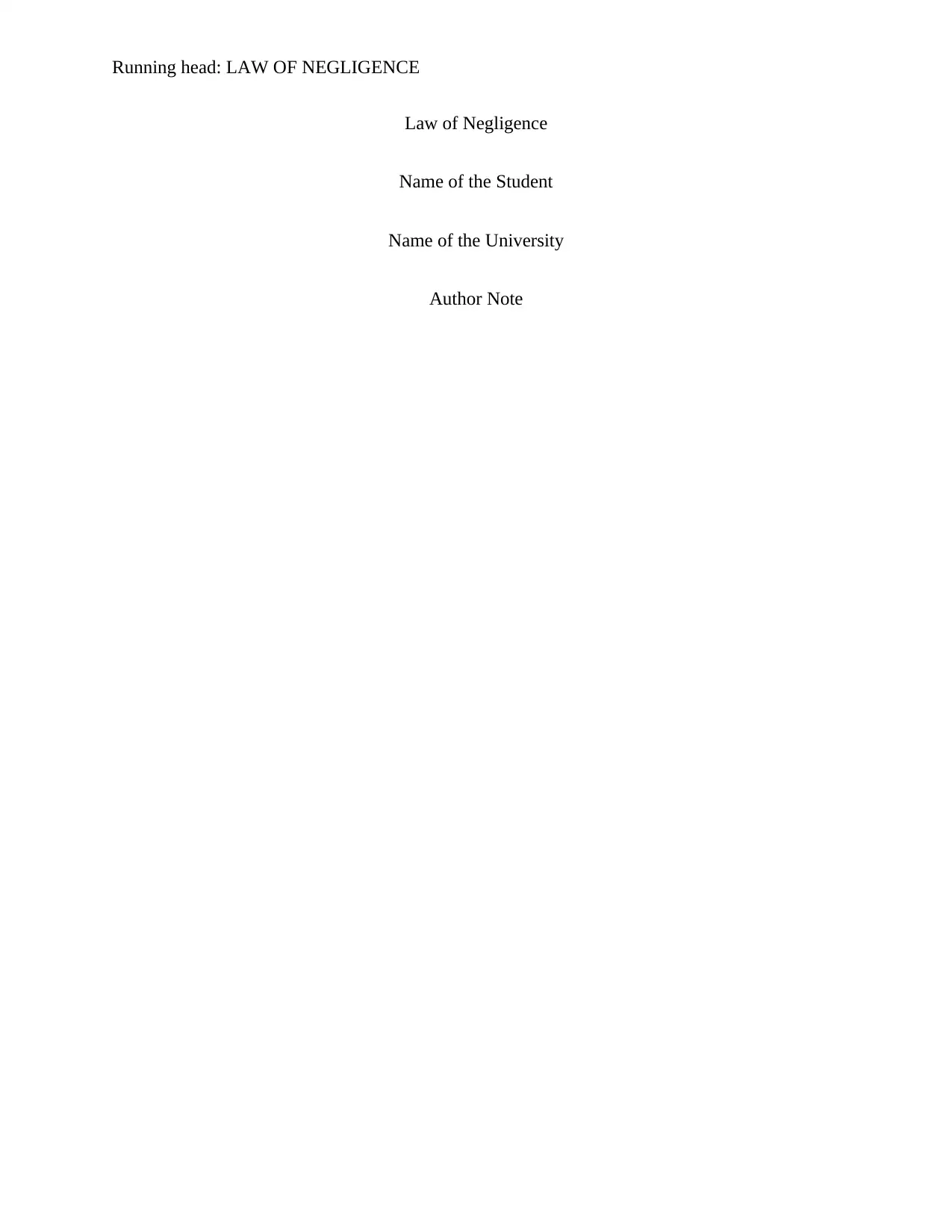
Running head: LAW OF NEGLIGENCE
Law of Negligence
Name of the Student
Name of the University
Author Note
Law of Negligence
Name of the Student
Name of the University
Author Note
Paraphrase This Document
Need a fresh take? Get an instant paraphrase of this document with our AI Paraphraser
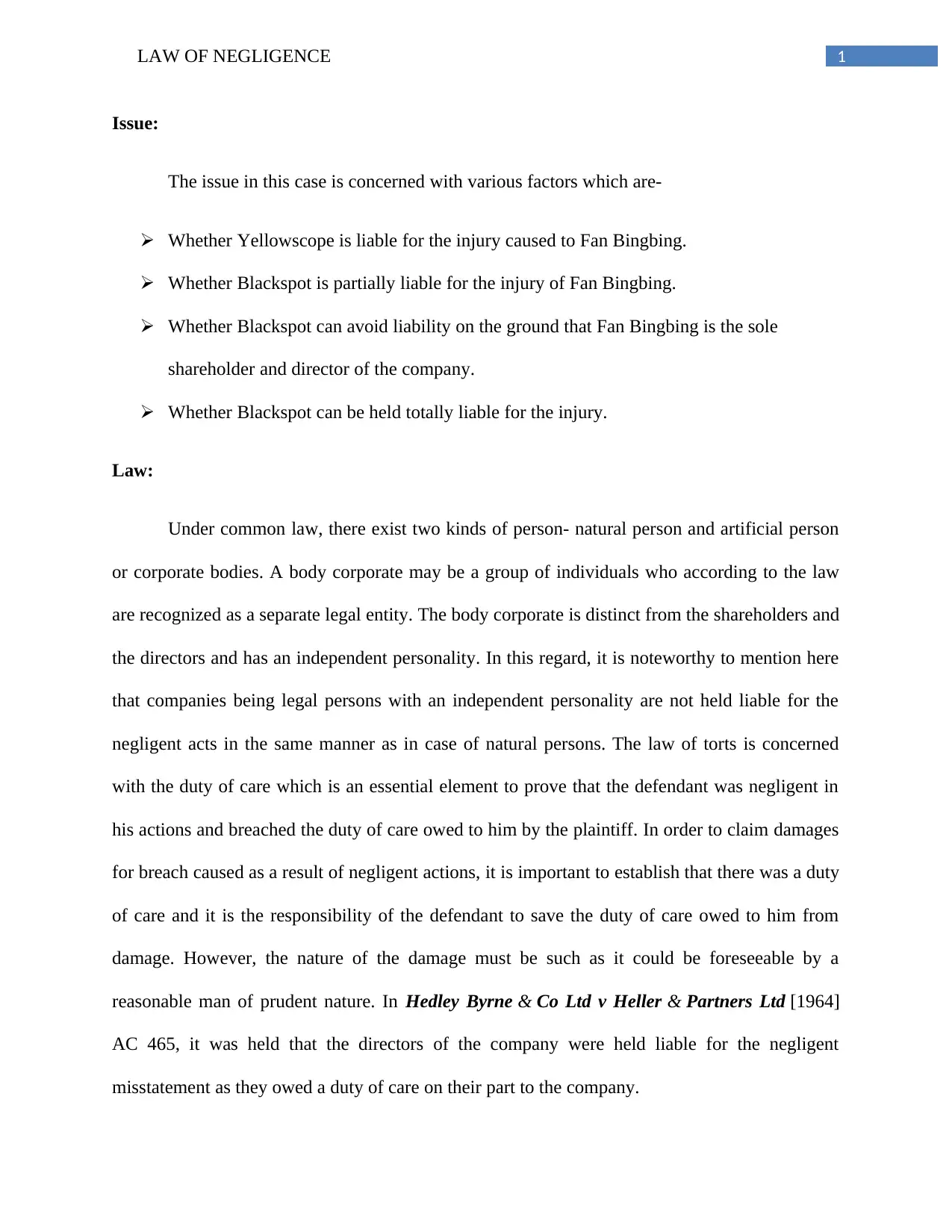
1LAW OF NEGLIGENCE
Issue:
The issue in this case is concerned with various factors which are-
Whether Yellowscope is liable for the injury caused to Fan Bingbing.
Whether Blackspot is partially liable for the injury of Fan Bingbing.
Whether Blackspot can avoid liability on the ground that Fan Bingbing is the sole
shareholder and director of the company.
Whether Blackspot can be held totally liable for the injury.
Law:
Under common law, there exist two kinds of person- natural person and artificial person
or corporate bodies. A body corporate may be a group of individuals who according to the law
are recognized as a separate legal entity. The body corporate is distinct from the shareholders and
the directors and has an independent personality. In this regard, it is noteworthy to mention here
that companies being legal persons with an independent personality are not held liable for the
negligent acts in the same manner as in case of natural persons. The law of torts is concerned
with the duty of care which is an essential element to prove that the defendant was negligent in
his actions and breached the duty of care owed to him by the plaintiff. In order to claim damages
for breach caused as a result of negligent actions, it is important to establish that there was a duty
of care and it is the responsibility of the defendant to save the duty of care owed to him from
damage. However, the nature of the damage must be such as it could be foreseeable by a
reasonable man of prudent nature. In Hedley Byrne & Co Ltd v Heller & Partners Ltd [1964]
AC 465, it was held that the directors of the company were held liable for the negligent
misstatement as they owed a duty of care on their part to the company.
Issue:
The issue in this case is concerned with various factors which are-
Whether Yellowscope is liable for the injury caused to Fan Bingbing.
Whether Blackspot is partially liable for the injury of Fan Bingbing.
Whether Blackspot can avoid liability on the ground that Fan Bingbing is the sole
shareholder and director of the company.
Whether Blackspot can be held totally liable for the injury.
Law:
Under common law, there exist two kinds of person- natural person and artificial person
or corporate bodies. A body corporate may be a group of individuals who according to the law
are recognized as a separate legal entity. The body corporate is distinct from the shareholders and
the directors and has an independent personality. In this regard, it is noteworthy to mention here
that companies being legal persons with an independent personality are not held liable for the
negligent acts in the same manner as in case of natural persons. The law of torts is concerned
with the duty of care which is an essential element to prove that the defendant was negligent in
his actions and breached the duty of care owed to him by the plaintiff. In order to claim damages
for breach caused as a result of negligent actions, it is important to establish that there was a duty
of care and it is the responsibility of the defendant to save the duty of care owed to him from
damage. However, the nature of the damage must be such as it could be foreseeable by a
reasonable man of prudent nature. In Hedley Byrne & Co Ltd v Heller & Partners Ltd [1964]
AC 465, it was held that the directors of the company were held liable for the negligent
misstatement as they owed a duty of care on their part to the company.
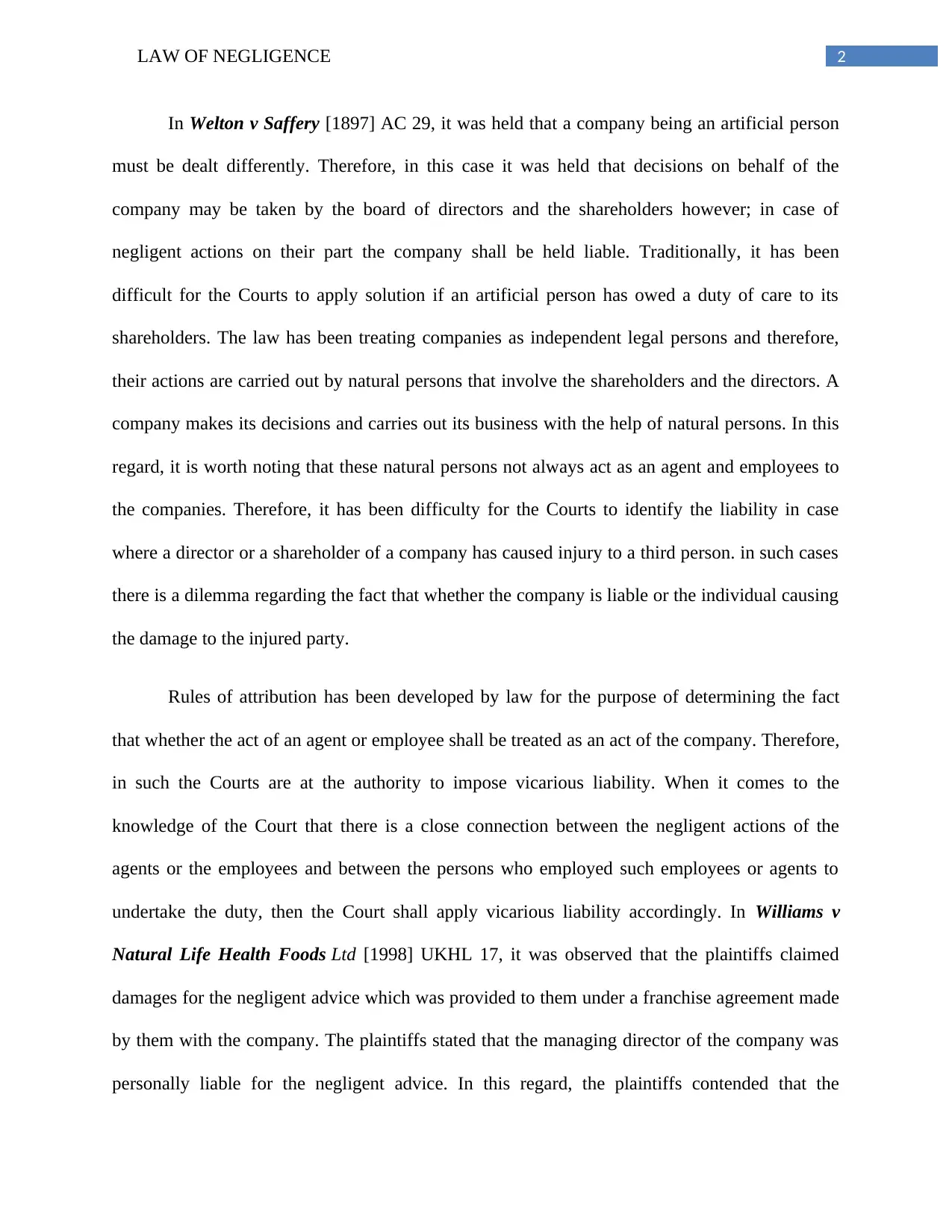
2LAW OF NEGLIGENCE
In Welton v Saffery [1897] AC 29, it was held that a company being an artificial person
must be dealt differently. Therefore, in this case it was held that decisions on behalf of the
company may be taken by the board of directors and the shareholders however; in case of
negligent actions on their part the company shall be held liable. Traditionally, it has been
difficult for the Courts to apply solution if an artificial person has owed a duty of care to its
shareholders. The law has been treating companies as independent legal persons and therefore,
their actions are carried out by natural persons that involve the shareholders and the directors. A
company makes its decisions and carries out its business with the help of natural persons. In this
regard, it is worth noting that these natural persons not always act as an agent and employees to
the companies. Therefore, it has been difficulty for the Courts to identify the liability in case
where a director or a shareholder of a company has caused injury to a third person. in such cases
there is a dilemma regarding the fact that whether the company is liable or the individual causing
the damage to the injured party.
Rules of attribution has been developed by law for the purpose of determining the fact
that whether the act of an agent or employee shall be treated as an act of the company. Therefore,
in such the Courts are at the authority to impose vicarious liability. When it comes to the
knowledge of the Court that there is a close connection between the negligent actions of the
agents or the employees and between the persons who employed such employees or agents to
undertake the duty, then the Court shall apply vicarious liability accordingly. In Williams v
Natural Life Health Foods Ltd [1998] UKHL 17, it was observed that the plaintiffs claimed
damages for the negligent advice which was provided to them under a franchise agreement made
by them with the company. The plaintiffs stated that the managing director of the company was
personally liable for the negligent advice. In this regard, the plaintiffs contended that the
In Welton v Saffery [1897] AC 29, it was held that a company being an artificial person
must be dealt differently. Therefore, in this case it was held that decisions on behalf of the
company may be taken by the board of directors and the shareholders however; in case of
negligent actions on their part the company shall be held liable. Traditionally, it has been
difficult for the Courts to apply solution if an artificial person has owed a duty of care to its
shareholders. The law has been treating companies as independent legal persons and therefore,
their actions are carried out by natural persons that involve the shareholders and the directors. A
company makes its decisions and carries out its business with the help of natural persons. In this
regard, it is worth noting that these natural persons not always act as an agent and employees to
the companies. Therefore, it has been difficulty for the Courts to identify the liability in case
where a director or a shareholder of a company has caused injury to a third person. in such cases
there is a dilemma regarding the fact that whether the company is liable or the individual causing
the damage to the injured party.
Rules of attribution has been developed by law for the purpose of determining the fact
that whether the act of an agent or employee shall be treated as an act of the company. Therefore,
in such the Courts are at the authority to impose vicarious liability. When it comes to the
knowledge of the Court that there is a close connection between the negligent actions of the
agents or the employees and between the persons who employed such employees or agents to
undertake the duty, then the Court shall apply vicarious liability accordingly. In Williams v
Natural Life Health Foods Ltd [1998] UKHL 17, it was observed that the plaintiffs claimed
damages for the negligent advice which was provided to them under a franchise agreement made
by them with the company. The plaintiffs stated that the managing director of the company was
personally liable for the negligent advice. In this regard, the plaintiffs contended that the
⊘ This is a preview!⊘
Do you want full access?
Subscribe today to unlock all pages.

Trusted by 1+ million students worldwide
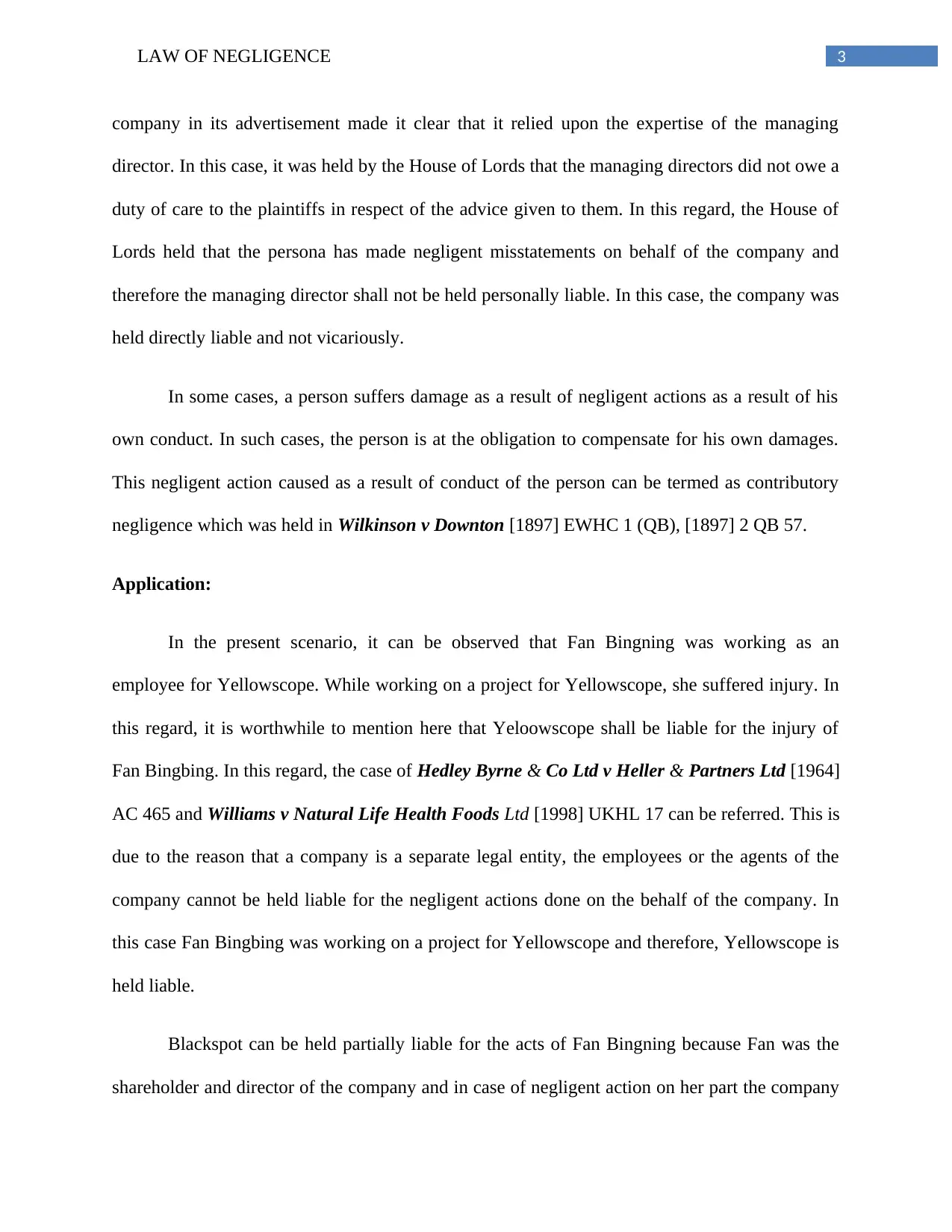
3LAW OF NEGLIGENCE
company in its advertisement made it clear that it relied upon the expertise of the managing
director. In this case, it was held by the House of Lords that the managing directors did not owe a
duty of care to the plaintiffs in respect of the advice given to them. In this regard, the House of
Lords held that the persona has made negligent misstatements on behalf of the company and
therefore the managing director shall not be held personally liable. In this case, the company was
held directly liable and not vicariously.
In some cases, a person suffers damage as a result of negligent actions as a result of his
own conduct. In such cases, the person is at the obligation to compensate for his own damages.
This negligent action caused as a result of conduct of the person can be termed as contributory
negligence which was held in Wilkinson v Downton [1897] EWHC 1 (QB), [1897] 2 QB 57.
Application:
In the present scenario, it can be observed that Fan Bingning was working as an
employee for Yellowscope. While working on a project for Yellowscope, she suffered injury. In
this regard, it is worthwhile to mention here that Yeloowscope shall be liable for the injury of
Fan Bingbing. In this regard, the case of Hedley Byrne & Co Ltd v Heller & Partners Ltd [1964]
AC 465 and Williams v Natural Life Health Foods Ltd [1998] UKHL 17 can be referred. This is
due to the reason that a company is a separate legal entity, the employees or the agents of the
company cannot be held liable for the negligent actions done on the behalf of the company. In
this case Fan Bingbing was working on a project for Yellowscope and therefore, Yellowscope is
held liable.
Blackspot can be held partially liable for the acts of Fan Bingning because Fan was the
shareholder and director of the company and in case of negligent action on her part the company
company in its advertisement made it clear that it relied upon the expertise of the managing
director. In this case, it was held by the House of Lords that the managing directors did not owe a
duty of care to the plaintiffs in respect of the advice given to them. In this regard, the House of
Lords held that the persona has made negligent misstatements on behalf of the company and
therefore the managing director shall not be held personally liable. In this case, the company was
held directly liable and not vicariously.
In some cases, a person suffers damage as a result of negligent actions as a result of his
own conduct. In such cases, the person is at the obligation to compensate for his own damages.
This negligent action caused as a result of conduct of the person can be termed as contributory
negligence which was held in Wilkinson v Downton [1897] EWHC 1 (QB), [1897] 2 QB 57.
Application:
In the present scenario, it can be observed that Fan Bingning was working as an
employee for Yellowscope. While working on a project for Yellowscope, she suffered injury. In
this regard, it is worthwhile to mention here that Yeloowscope shall be liable for the injury of
Fan Bingbing. In this regard, the case of Hedley Byrne & Co Ltd v Heller & Partners Ltd [1964]
AC 465 and Williams v Natural Life Health Foods Ltd [1998] UKHL 17 can be referred. This is
due to the reason that a company is a separate legal entity, the employees or the agents of the
company cannot be held liable for the negligent actions done on the behalf of the company. In
this case Fan Bingbing was working on a project for Yellowscope and therefore, Yellowscope is
held liable.
Blackspot can be held partially liable for the acts of Fan Bingning because Fan was the
shareholder and director of the company and in case of negligent action on her part the company
Paraphrase This Document
Need a fresh take? Get an instant paraphrase of this document with our AI Paraphraser
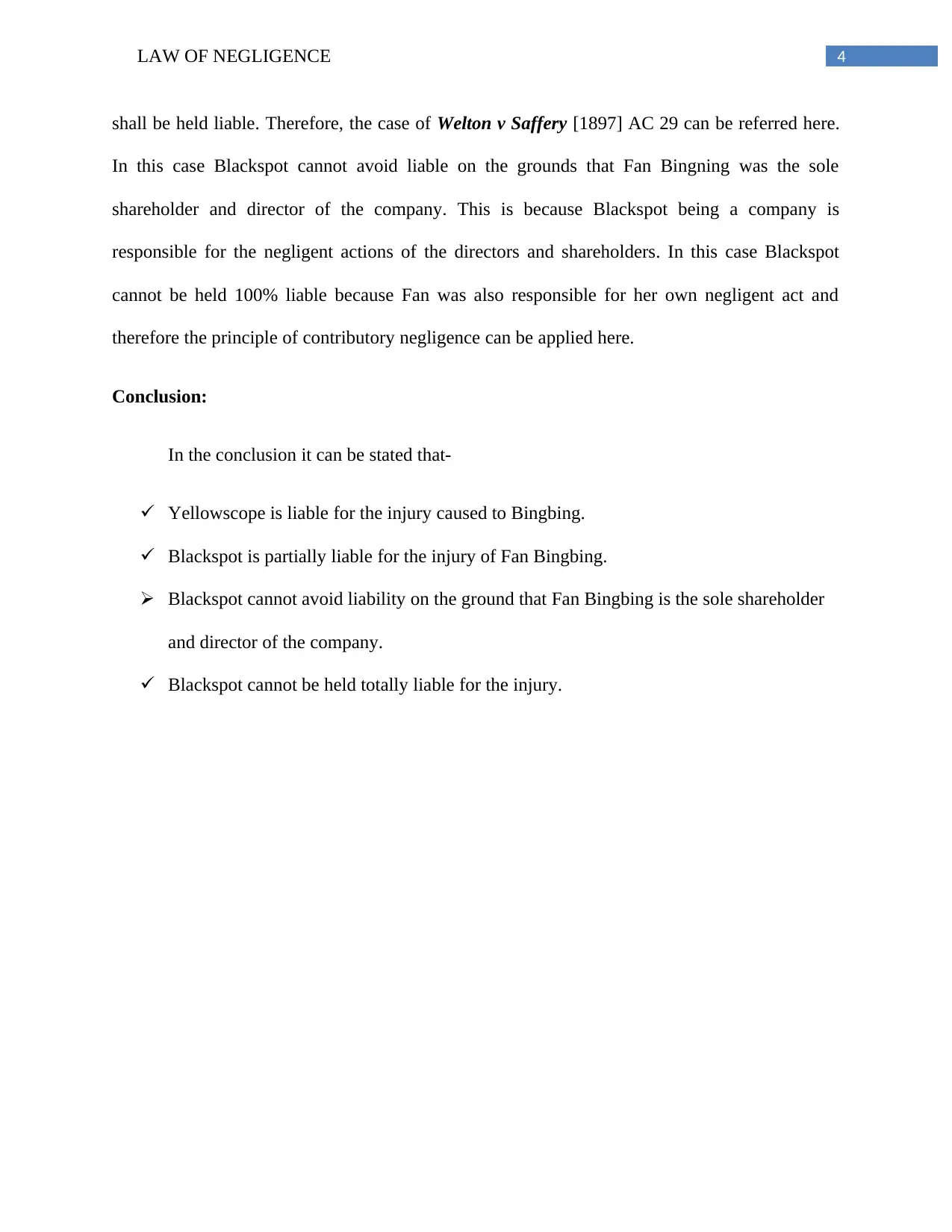
4LAW OF NEGLIGENCE
shall be held liable. Therefore, the case of Welton v Saffery [1897] AC 29 can be referred here.
In this case Blackspot cannot avoid liable on the grounds that Fan Bingning was the sole
shareholder and director of the company. This is because Blackspot being a company is
responsible for the negligent actions of the directors and shareholders. In this case Blackspot
cannot be held 100% liable because Fan was also responsible for her own negligent act and
therefore the principle of contributory negligence can be applied here.
Conclusion:
In the conclusion it can be stated that-
Yellowscope is liable for the injury caused to Bingbing.
Blackspot is partially liable for the injury of Fan Bingbing.
Blackspot cannot avoid liability on the ground that Fan Bingbing is the sole shareholder
and director of the company.
Blackspot cannot be held totally liable for the injury.
shall be held liable. Therefore, the case of Welton v Saffery [1897] AC 29 can be referred here.
In this case Blackspot cannot avoid liable on the grounds that Fan Bingning was the sole
shareholder and director of the company. This is because Blackspot being a company is
responsible for the negligent actions of the directors and shareholders. In this case Blackspot
cannot be held 100% liable because Fan was also responsible for her own negligent act and
therefore the principle of contributory negligence can be applied here.
Conclusion:
In the conclusion it can be stated that-
Yellowscope is liable for the injury caused to Bingbing.
Blackspot is partially liable for the injury of Fan Bingbing.
Blackspot cannot avoid liability on the ground that Fan Bingbing is the sole shareholder
and director of the company.
Blackspot cannot be held totally liable for the injury.
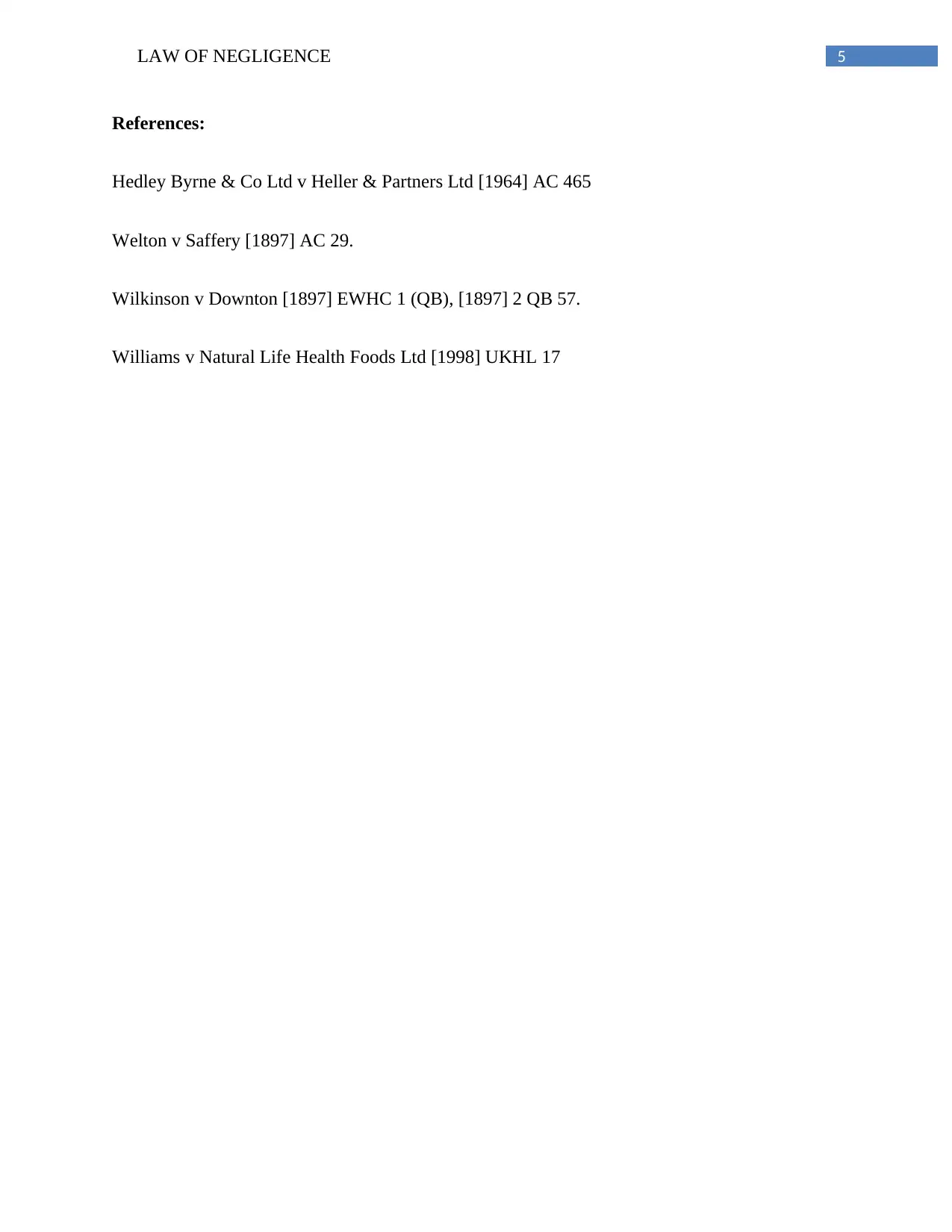
5LAW OF NEGLIGENCE
References:
Hedley Byrne & Co Ltd v Heller & Partners Ltd [1964] AC 465
Welton v Saffery [1897] AC 29.
Wilkinson v Downton [1897] EWHC 1 (QB), [1897] 2 QB 57.
Williams v Natural Life Health Foods Ltd [1998] UKHL 17
References:
Hedley Byrne & Co Ltd v Heller & Partners Ltd [1964] AC 465
Welton v Saffery [1897] AC 29.
Wilkinson v Downton [1897] EWHC 1 (QB), [1897] 2 QB 57.
Williams v Natural Life Health Foods Ltd [1998] UKHL 17
⊘ This is a preview!⊘
Do you want full access?
Subscribe today to unlock all pages.

Trusted by 1+ million students worldwide
1 out of 6
Related Documents
Your All-in-One AI-Powered Toolkit for Academic Success.
+13062052269
info@desklib.com
Available 24*7 on WhatsApp / Email
![[object Object]](/_next/static/media/star-bottom.7253800d.svg)
Unlock your academic potential
Copyright © 2020–2026 A2Z Services. All Rights Reserved. Developed and managed by ZUCOL.





